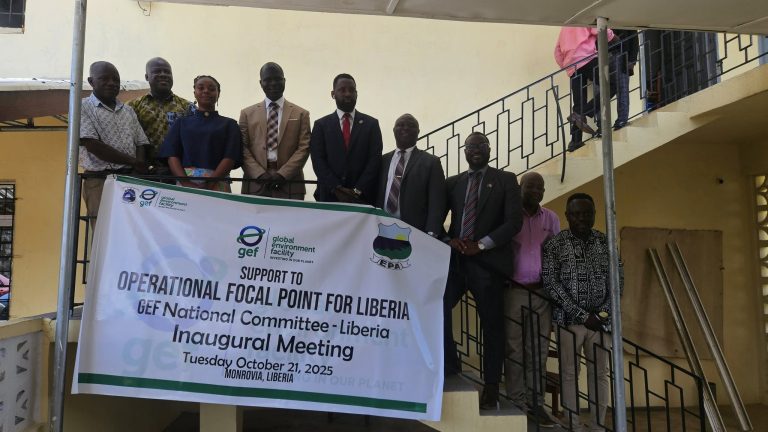Posts Categories
Latest Posts

Monrovia, October 21, 2025 – The Environmental Protection Agency of Liberia (EPA), through its Executive Director and Global Environment Facility (GEF) Operational Focal Point, Dr. Emmanuel Urey King Yarkpawolo, has announced that Liberia has successfully utilized one hundred percent of its allocation under the GEF-8 cycle.
The announcement was made during the inaugural meeting of the National GEF Committee, held on Tuesday at the National University Climate Action Lab on the University of Liberia’s Capitol Hill campus.
The one-day meeting brought together representatives from government ministries, environmental agencies, development partners, among others.
The event marked an important milestone in Liberia’s effort to strengthen coordination, oversight, and accountability in managing GEF-funded environmental projects across the country.
Presenting Liberia’s portfolio update, Dr. Yarkpawolo disclosed that the country has fully utilized its GEF-8 allocation of US$8.6 million, surpassing the global average utilization rate of 77.9 percent.
He explained that the funds were directed toward key environmental areas, including biodiversity conservation, climate change mitigation, and land degradation management.
According to him, Liberia’s strong performance under GEF-8 demonstrates the country’s growing capacity to deliver impactful environmental programs aligned with national development priorities.
Dr. Yarkpawolo reaffirmed the EPA’s commitment to ensuring that all GEF-funded projects are implemented with transparency, accountability, and in harmony with Liberia’s environmental agenda.
He emphasized that the EPA will continue to play a leadership role in coordinating projects that bring tangible benefits to communities and contribute to global climate action efforts.
“This achievement demonstrates Liberia’s seriousness in environmental governance and our ability to deliver results through global support,” Dr. Yarkpawolo said. “As we prepare for the next GEF-9 cycle, our focus is on building stronger coordination, improving project delivery, and ensuring that every investment benefits both people and the planet.”
The Global Environment Facility (GEF) is the world’s largest multilateral environmental fund that supports developing countries in addressing global challenges such as biodiversity loss, climate change, land degradation, and waste management.
Established in 1991 as a pilot program by the World Bank, UNDP, and UNEP, and later made permanent after the 1992 Rio Earth Summit, the GEF provides financial assistance to projects that protect the environment and promote sustainable development.
It serves as a financial mechanism for major multilateral environmental conventions, including the Convention on Biological Diversity, the UN Framework Convention on Climate Change, the UN Convention to Combat Desertification, the Stockholm and Minamata Conventions, and the new Biodiversity Beyond National Jurisdiction Agreement.
The meeting also marked the official launch of the National GEF Committee, a coordination body established to improve country ownership, transparency, and strategic oversight of GEF-funded activities in Liberia.
The committee is chaired by the GEF Operational Focal Point and hosted at the EPA. Its membership includes representatives from the Ministry of Finance and Development Planning, the Office of the President, the Director of Multilateral Environmental Agreements, and national focal points for the United Nations environmental conventions
